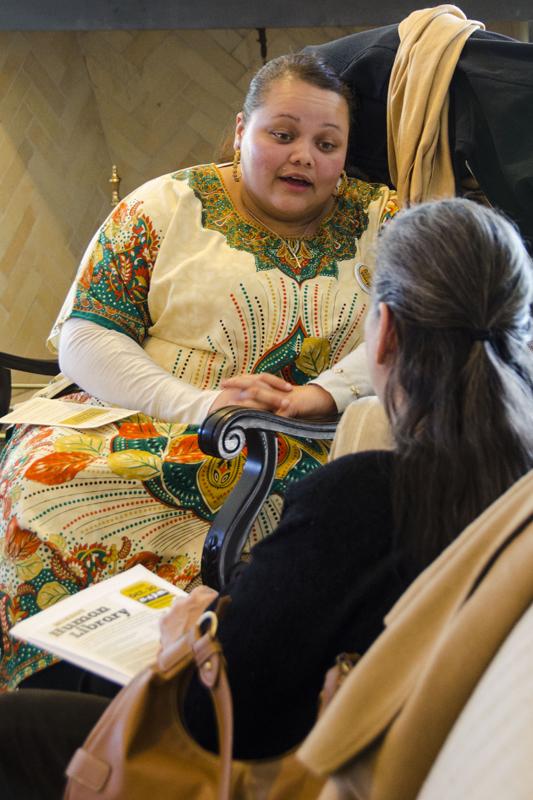As students and staff ventured into Memorial Union’s Alumni-Faculty Lounge on Tuesday, they encountered a different kind of library.
Instead of stacks of books, this human library featured people willing to share their stories via one-on-one conversation.
Concluding the third Diversity Summit, the Mizzou Human Library Project, which ran from noon to 4 p.m., offered visitors a chance to gain understanding of different kinds of people and dissolve stereotypes, said Chancellor’s Diversity Initiative multimedia specialist Niki Stanley, who had the idea for the event.
The library served as a way to help achieve one of the main diversity goals on campus, Stanley said.
“I think our main campus diversity goal in general is to make a more inclusive campus,” Stanley said. “Part of creating a more inclusive campus is understanding and having a basic sense of respect for people who are going to be different than you are.”
The library featured 14 different “books”: actual people who came from various diverse backgrounds. All the “books” were volunteers who took interest in the project after Stanley sent an announcement over MU Info and various emails beforehand asking if anyone would be want to be a “book” for the library. The volunteers represented a good mix of students, faculty and staff, Stanley said.
“I think it’s easy to put labels on people when you don’t know their full story,” Stanley said. “With a human library you have one-on-one conversations with people. I think you really talk to people as a person, not as the label that they carry or the group that they necessary identify with. You’re really getting to know the person.”
Being able to sit down with people and have a conversation serves as a good method for getting to know someone and overcoming prejudices, graduate student Shan Yun Wu said.
The library created a comfortable environment for visitors to engage in conversation with speakers and visitors talking while lounging in sofas or chairs and providing anonymity, Stanley said.
“I think there was a genuine curiosity about people (who participated in the library),” Stanley said. “The good thing about it was that it was really anonymous. We only recorded your first time. We didn’t take any personal information. You could ask some questions about someone and you may never see that person again.”
Graduate student Amina Simmons was the “book” titled “The Business of None of Your Business.” Amina discussed how the question “what are you?” can be a hurtful and ignorant question to ask and that someone’s race, sexual orientation and ethnicity should not matter during everyday interactions.
“I think we have been socialized to think that if we can figure a person out, we will know how to interact with them,” Simmons said. “But I think a lot of that goes back to making ourselves comfortable. (Some think that) ‘If I don’t know what you are, if I can’t pinpoint you … then I’m uncomfortable and I don’t know how to handle that.’ And I wish more people were comfortable being uncomfortable, because I think those are the spaces where you unlearn your ignorance. I think those are the spaces where you push yourself to a learning edge and you really, truly grow.”
Another person featured at the library was graduate student Ahmed Alawadhi, who was the book titled “Arab and Muslims, Who We Really Are: Read it straight from the source.” Alawashi said he found the project interesting and volunteered to be a book to give people insight on Arab and Muslim culture.
“I’ve seen and heard a lot about misconceptions about my country and my religion,” he said. “So, I thought this would be a good opportunity to share it with people and show them who we really are, because they have this bad image about us. Muslims are stereotyped as extremists, and Arabs, on the other hand — I get a lot that people think we are rich people, we have all this oil and don’t care about the community, but that is not who we are, that is not what we represent.”
Some of the other featured “books” focused on misconceptions about depression, eating disorders, Mormonism, blindness among other topics.
After experiencing the human library, Stanley said he hopes that visitors gained insight into the lives of others and an appreciation for diversity.
“I hope that they come out with a greater appreciation for people who are different from themselves,” Stanley said. “Maybe it’s cleared out some of the stereotypes that they had at the time.”








